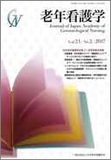Japanese
English
- 販売していません
- Abstract 文献概要
- 参考文献 Reference
抄録
本研究では特別養護老人ホームの入居者を対象に,夜間,排泄行動が自立している者(以下,自立群)と定時に排泄介助を受けている者(以下,介助群)の睡眠状態を比較し,睡眠改善ケアのあり方を検討した.今回,マット型睡眠計を用いて収集した1年間の睡眠データを用いて検討した.分析対象者は14人で自立群が8人,介助群が6人であった.平均年齢は,自立群86.9±6.5歳,介助群85.3±10.9歳であった.移動手段は,歩行が自立群4人,介助群2人,車いす自走が自立群4人,介助群4人であった.
中途覚醒率は,自立群13.9%(90.2±38分),介助群11.1%(74.3±20分)であり,介助群のほうに若干中途覚醒が少なかったがその差は有意とはならなかった.また,入眠時刻,起床時刻,睡眠時間,レム睡眠率,浅睡眠率,深睡眠率のいずれも自立群と介助群で有意な差は認められず,定時の排泄介助が必ずしも要介護高齢者の睡眠の質を低下させているとはいえないことが明らかになった.要介護高齢者の睡眠を妨げないよう,できるだけ排泄介助の回数を少なくするという考え方があるが,夜間の排泄介助の回数やタイミングは,高齢者個々の睡眠パターンや質を観察しながら検討する必要性が示された.
In this study, we examined how the nature of care affects sleep-state by comparing sleep-state data between elderly residents at a special nursing home who were independent pertaining to their excretion (independent group) and those who were receiving regular night excretion assistance (assistance group). We examined sleep-state data collected over one year using mattress-type sleep monitors. Fourteen subjects were analyzed: eight in the independent group and six in the assistance group. Average ages of subjects in the independent and assistance groups were 86.9 ±6.5 and 85.3±10.9, respectively. The means of transportation were walking (four subjects in the independent group and two in the assistance group) and by wheelchair without support (four subjects in each of the two groups).
The rate of interrupted sleep was 13.9% (90.2 ± 38 min) and 11.1% (74.3 ± 20 min) in the independent and assistance groups, respectively. The assistance group had slightly fewer instances of interrupted sleep, but the difference was not significant. Furthermore, no significant differences were observed between the two groups in the sleep-onset time, wake-up time, sleep duration, rate of REM sleep, rate of light sleep, and rate of deep sleep. Regular night excretion assistance was not always found to deteriorate the sleep-state in elderly people requiring long-term care. One approach to preventing inhibited sleep-state in elderly people requiring long-term care is to reduce the number of times of night excretion care as much as possible; however, the results of our study suggest that it is necessary to examine the number of times and timing of night excretion care while observing quality of sleep and sleep patterns of elderly people individually.
Copyright © 2017, Japan Academy of Gerontological Nursing All rights reserved.


